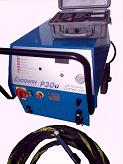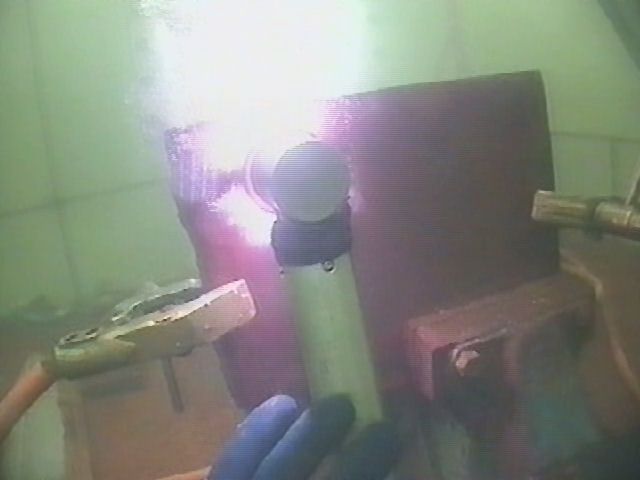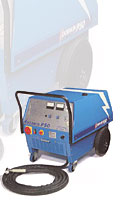|
 We
have developed what is believed to be the worlds first
purpose made plasma cutting system for use by divers.
Working closely with the UK Ministery of Defence (MOD),
with input from the Royal and U.S. Navy`s and others,
the potential hazards were identified, and solutioins
found eliminate risk The equipment has so far been proven
in trials down to 30m (100’) depth, cutting metals
to 40mm (1.5”) thick. We
have developed what is believed to be the worlds first
purpose made plasma cutting system for use by divers.
Working closely with the UK Ministery of Defence (MOD),
with input from the Royal and U.S. Navy`s and others,
the potential hazards were identified, and solutioins
found eliminate risk The equipment has so far been proven
in trials down to 30m (100’) depth, cutting metals
to 40mm (1.5”) thick.
Plasma
Arc metal cutting equipment typically uses voltages of
300 v or more, against a background of Codes of Practice
in diving work favouring no more than 30 volts. Whilst
plasma cutting equipment has occasionally been used underwater,
there have been risks present requiring very careful application
of safe working practices. This equipment is designed
to control electrical leakage paths at source and prevent
them reaching the diver. The methods have application
to any exposed voltage process where currently shocks
are routinely experienced.
 Click
here to view a paper on developement of electrical safety
underwater. Click
here to view a paper on developement of electrical safety
underwater.
 The
advantages over other metal cutting methods currently
in use include high cutting speed, low running cost, and
excellent cut quality. Apart from ensuring electrical
safety, safety issues concerning oxygen and blow-back
are eliminated and the environmental impact reduced. In
spite of higher initial; equipment cost the combination
of high cutting speed and low running cost can show a
pay-back inside one week! This is before considering the
savings that good cut quality might also bring. The
advantages over other metal cutting methods currently
in use include high cutting speed, low running cost, and
excellent cut quality. Apart from ensuring electrical
safety, safety issues concerning oxygen and blow-back
are eliminated and the environmental impact reduced. In
spite of higher initial; equipment cost the combination
of high cutting speed and low running cost can show a
pay-back inside one week! This is before considering the
savings that good cut quality might also bring.
Click on
the picture to see video of a piece of
25mm mild steel being cut in a tank trial. The length
of cut is 250mm.
Application
Wheter Offshore, in MArine
Engineering or Civil Works, the ability to cut metal underwater
can be requirment. Established methods are often slow
and can have a high consumable cost. The logistics of
supplying gas to those processes using oxygen can be a
further problem.
Air Plasma cutting overcomes
many of these problems by offering high cutting speeds
at relatively low running costs. It offers further advantages
in the quality of the cut edge, and the precision and
degree of control of the cut, eliminating secondary operations
such as grinding, which may be required with some established
methods.
The disadvantages is the
higher initial cost, although this is swiftly recovered
in use, and the need for training, as with any new process.
With proper training in correct operation materials in
excess of 40mm can be cut. The equipment can also be used
on the surface where the full 65mm capactiy of the standard
P30 is available.
|



